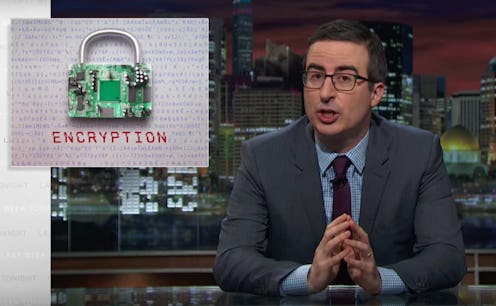News
John Oliver Takes On The Feds Vs. Apple

Apple and the FBI have been duking it out for weeks now, and John Oliver has just jumped into the fight. On Sunday night, Oliver worked through the iPhone encryption debacle and how the government's requests that Apple create a backdoor to unlock an iPhone would make all your personal information a little — or a lot — less safer.
As Oliver explains, save for entitling your emails "FWD: FWD: FWD: FWD: Hilarious joke from Uncle Walter," the only way to keep your private correspondence safe is with encryption. In the case of an iPhone, your fingerprint and 4- to 6-digit passcode, are used to unlock the phone and unencrypt the information in your call log, text history, and in the many applications downloaded to the phone.
If you don't lock your phone and then you lose it, anyone who finds it could find themselves with immediate access to your whole digital life, and then looking through your vacation pics or ordering themselves something on Amazon. Oliver walks through the kinds of things stored on the average smartphone:
Encryption can protect the things most important to us. Our financial information, health records, dick pics, trade secrets, classified government records, dick pics, our physical location, the physical location of our dicks, credit card information, dick pics, and pictures of our dicks.
You'll notice a certain obsession there on Oliver's part, but for now at least, you can be glad that's not what the government is going after. Since their investigation into the San Bernardino shooting discovered a locked iPhone that was used by one of the shooters, the FBI has wanted it unlocked. They've argued that Apple could unlock this one iPhone by creating a backdoor that would allow unlimited attempts to guess the passcode — something the iPhone would normally stop by wiping the data after the 10th attempt.
The government took Apple to court and won the first round; the judged ordered the company help the FBI access the data — just this once. Apple appealed and responded with an open letter that explained how hacking this one iPhone would in the end be like hacking every iPhone out there and would put its users at the mercy of cyber criminals. The appeals process continues along. Meanwhile Apple, Facebook, and other tech companies are working to improve the encryption of their products.
The government has claimed that only the one iPhone would need to be hacked — and that Apple could destroy its tech workaround after it's used. But Oliver doesn't buy it. For one, there's a lot of requests on the books. One New York district attorney has 175 iPhones he would like decrypted to gather evidence. Plus how do you delete it?
He points out that the politicians and FBI officials may not understand much about how technology work — or are pretending not to by saying Apple can tear up the code and throw it in the fire place once this one case is over. Oliver's take? "Oh, come on. You know Apple's not writing its code on paper next to a fireplace. They're a cutting edge technology company, not Lord Grantham," he said. Touché.
Oliver also gives some real, scary examples of what could happen if some sort of "master key," as Apple called it, were created. Some hackers working with Wired magazine were able to hack a Jeep that was driving down a highway and turn off its motor. If a backdoor to encryption existed, this could be even easier. Even if this one time solution is made just for the government, there's no guarantee it wouldn't be stolen or hacked.
Image: Last Week Tonight With John Oliver/HBO